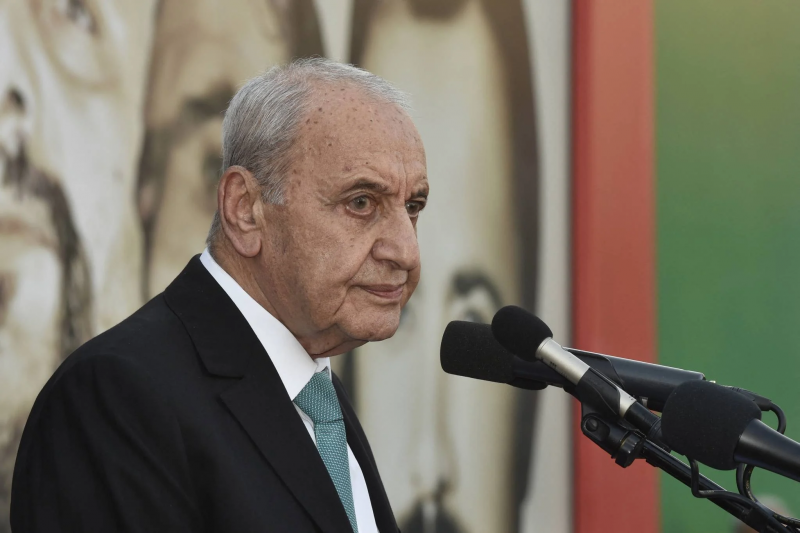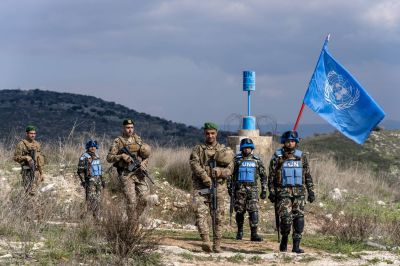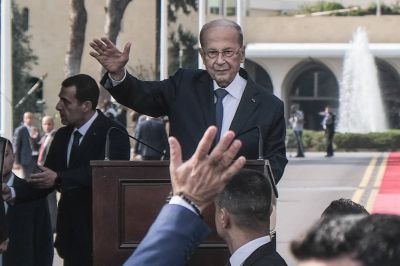
Parliament Speaker and leader of the Amal Movement Nabih Berri, in Beirut, on Aug. 31, 2023. (Credit: AFP/File photo)
BEIRUT — Parliament Speaker Nabih Berri stated that Lebanon is keen on remaining committed to UN Resolution 1701 and stressed that the danger in the region "originates from Israel."
He also called for the swift election of a president, in an interview with Lebanese daily Al Joumhouria.
Berri also explained that he will call for a parliamentary session, before Dec. 15, to discuss extending Army commander Joseph Aoun's mandate for a year. Aoun's mandate as the head of the army expires in Jan. 2024.
In his interview, the parliamentary speaker noted that Lebanon has remained committed to Resolution 1701 "while Israel has violated it thousands of times."
No amendments
Resolution 1701 ended the July 2006 war between Hezbollah and Israel and necessitated significant Lebanese Army deployment in the area of southern Lebanon controlled by UNIFIL.
Berri refused any amendments to this resolution, stating that "no one can impose conditions or modifications on Lebanon, and any step in this direction is unacceptable to us and will be confronted. The only requirement is for them to implement the resolution and nothing else."
Berri pointed out that "anyone who raises or discusses this matter with us, our response is clear. International borders are known and clear. There are 13 points, some have been settled, and others remain to be resolved, leading to the Shebaa Farms, Kfar Shouba Hills, and the northern part of the Ghajar town. Additionally, there's the 'B1' point."
In July Israeli media had reported that US emissary Hochstein could soon mediate a delineation across Lebanon's southern land border with Israel, while in Lebanon, caretaker Prime Minister Najib Mikati said in an interview that his cabinet is ready to negotiate.
'Danger in region originates from Israel'
In his interview with Al Joumhouria, Berri emphasized that "despite the ongoing efforts to extend the ceasefire in Gaza, the focus should be on being aware of Israel's bellicose intentions, whether in Gaza or against Lebanon. We've said this to all the envoys we've met, stressing that the danger to Lebanon and the entire region originates from Israel."
Berri, in response to a question regarding the extension issue for Army Commander General Joseph Aoun's term, stated, said that his [Berri's] "effective intervention in this matter begins as of Dec. 1. I will call for a legislative session before Dec. 15, following a prior meeting of the Parliament's Bureau. There are several bills from the government alongside numerous urgent draft laws, including a proposal related to extending the tenure by a year for those holding the rank of general, which will be included for consideration in that session."
Aoun's name is circulating among the potential presidential candidates, in a Lebanon plagued by over a year-long presidential vacancy.
To avoid a vacancy at the head of the military institution in the absence of a President of the Republic, the Lebanese Forces presented a bill raising the retirement age of the army chief to 61 years, this bill was welcomed by the head of the Maronite church Bechara al-Rai. The initiative was vetoed by the Free Patriotic Movement and Parliament Speaker Nabih Berri. The Kataeb also said they believe that the chamber does not have the right to legislate during a period of presidential vacancy.
The leader of the Marada movement, Sleiman Frangieh, is also opposed to the extension of Aoun's mandate.
Presidential election
"We should elect a president for the republic...[as soon as possible.]...delaying the election of the president is no longer permissible. But, as I've said before, what delays it is the Maronite-Maronite conflict [referring to the Lebanese Forces and the Free Patriotic Movement]. Unfortunately, they get upset if I point that out, even though this is the reality of the dispute. Let them settle their options and make their decisions, and let's descend to the parliamentary council and elect the president."
After 12 voting rounds since former president Michel Aoun's term ended last year on Oct. 31, endless diatribes, countless meetings, as well as local and international attempts at mediation, were initiated, and still a new president has not been elected.
French special envoy Jean-Yves Le Drian is currently in Lebanon, on his first visit since the beginning of the conflict between Israel and Hamas and the rise of tension along the southern border, and has been meeting politicians in Lebanon in a bid to unblock the nearly one-year presidential deadlock and to help ensure that Resolution 1701 is implemented. In a meeting Le Drian had with caretaker Prime Minister Najib Mikati, the French envoy allegedly warned against any move that could lead Lebanon towards an inopportune escalation with Israel.


